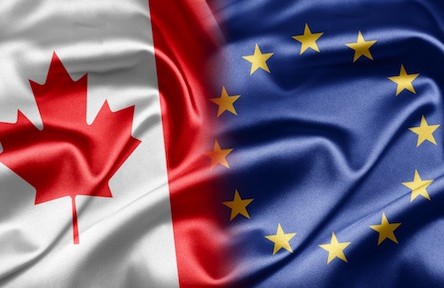European Commission proposes signature and conclusion of EU-Canada trade deal.
Today the European Commission formally proposed to the Council of the EU the signature and conclusion of a free trade agreement between the EU and Canada, known as the Comprehensive Economic and Trade Agreement, or CETA.
The deal is set to benefit people and businesses – big and small – across Europe as of the first day of its implementation. To allow for a swift signature and provisional application, so that the expected benefits are reaped without unnecessary delay, the Commission has decided to propose CETA as 'mixed' agreement. This is without prejudice to its legal view, as expressed in a case currently being examined by the European Court of Justice concerning the trade deal reached between the EU and Singapore. With this step, the Commission makes its contribution for the deal to be signed during the next EU-Canada Summit, in October.
President Jean-Claude Juncker said: "The trade agreement between the EU and Canada is our best and most progressive trade agreement and I want it to enter into force as soon as possible. It provides new opportunities for European companies, while promoting our high standards for the benefit of our citizens. I have looked at the legal arguments and I have listened to Heads of State or Government and to national Parliaments. Now it is time to deliver. The credibility of Europe's trade policy is at stake."
EU Trade Commissioner Cecilia Malmström added: "The agreement reached with Canada is a milestone in European trade policy. It is the most ambitious trade agreement that the EU has ever concluded and will deepen our longstanding relations with Canada. It will help to generate much-needed growth and jobs while fully upholding Europe's high standards in areas like food safety, environmental protection and people's rights at work. This is what our trade policy is all about. I now hope that the deal with Canada can be signed, provisionally applied and concluded quickly, to the benefit of consumers, workers, and entrepreneurs – this is an agreement that Europe needs. Meanwhile, the open issue of competence for such trade agreements will be for the European Court of Justice to clarify, in the near future. From a strict legal standpoint, the Commission considers this agreement to fall under exclusive EU competence. However, the political situation in the Council is clear, and we understand the need for proposing it as a 'mixed' agreement, in order to allow for a speedy signature."
After receiving the green light from the Council and the consent of the European Parliament it will be possible to provisionally apply the agreement. From day one, CETA will scrap almost all customs duties, saving EU firms hundreds of millions of euros a year in duty payments, thus also benefitting European consumers directly, by reducing prices and increasing choice of products imported from Canada.
It will boost trade in services, create new market access and provide better access for European suppliers of services in which EU companies are world leaders, ranging from maritime services, telecoms, and engineering to environmental services and accountancy. It will make it easier for service suppliers to travel between the EU and Canada to connect with their customers. It will facilitate the recognition of professional qualifications for regulated professions (such as architects, accountants and engineers), opening up new opportunities for professionals in these sectors. And it will allow EU companies to bid for Canadian public contracts at all levels of government – federal, provincial and local – and in areas from IT systems to roads to trains.
Besides cutting customs duties, CETA will help cut costs for EU firms, especially the smaller ones. This will happen thanks to the mutual recognition of so-called "conformity assessment certificates" for a wide range of products, from electrical goods to toys. For example, if an EU firm wants to export toys it will only need to get its product tested once, in Europe, to obtain a certificate valid for Canada, thus saving time and money.
Canada has also taken commitments to follow the EU's approach and publish all its public procurement tenders on a single website. This will make it much easier for interested EU companies to access the information they need about such tenders.
Thanks to CETA, Canadian and EU businesses will now compete on a truly level playing-field.
CETA also contains strong rules on the protection of labour rights and the environment. Both sides have pledged never to undermine the EU's high standards for the sake of commercial interests, but instead to work together to encourage others around the world - particularly developing countries - to raise their own.
Over 140 European Geographical Indications of food and drink products (from Tiroler Speck, from Austria, to Gouda and Roquefort cheeses from the Netherlands and France) will enjoy a high level of protection in the Canadian market, whereas without the agreement there is no such protection. CETA will make sure that only genuine products can be sold in Canada under those names.
In addition, CETA introduces a new investment court system and enhanced rules on investment protection. This guarantees the right of EU governments to regulate in the interest of their citizens, while still encouraging foreign investors by protecting their investments. The new system also makes the resolution of investment disputes fairer and more transparent. As such it serves as an important step towards the EU's ultimate goal of a global investment court.
Following a decision by the Council, it will be possible to provisionally apply CETA. Its full entering into force will be subject to the conclusion by the EU, through a Council decision with the consent of the European Parliament, and by all Member States through the relevant national ratification procedures.









